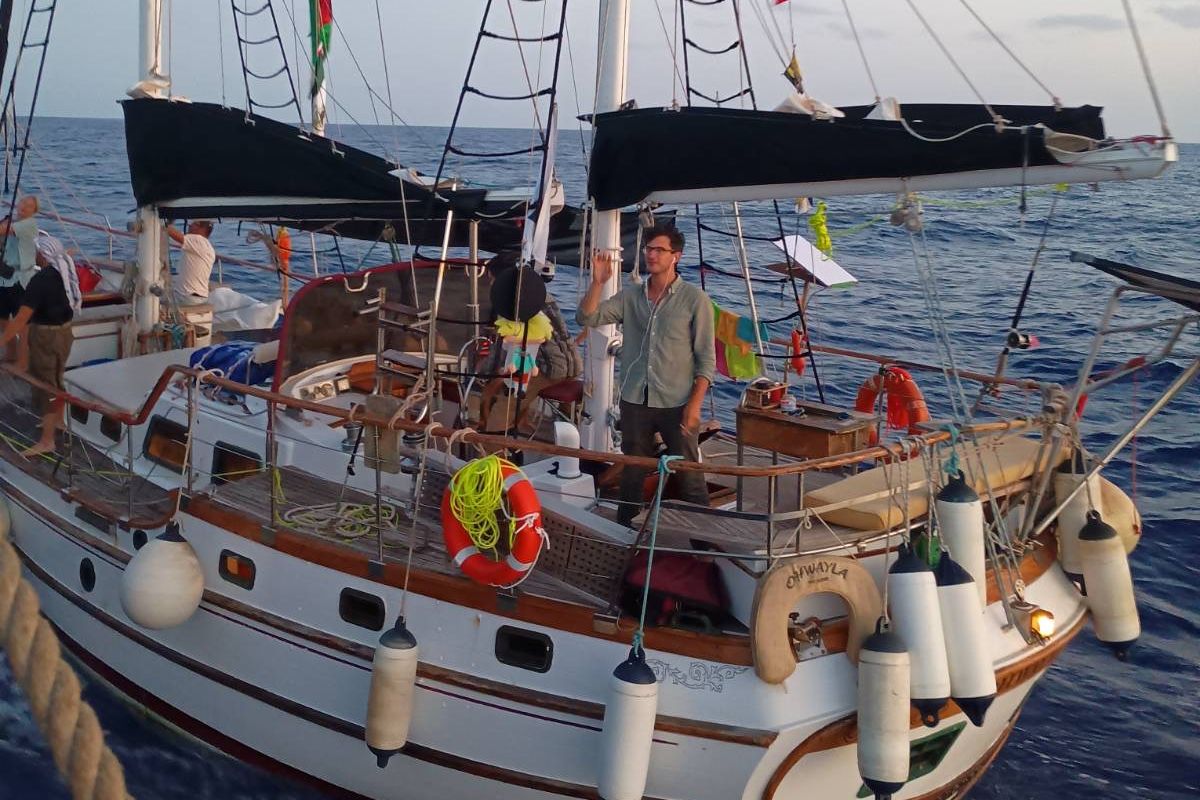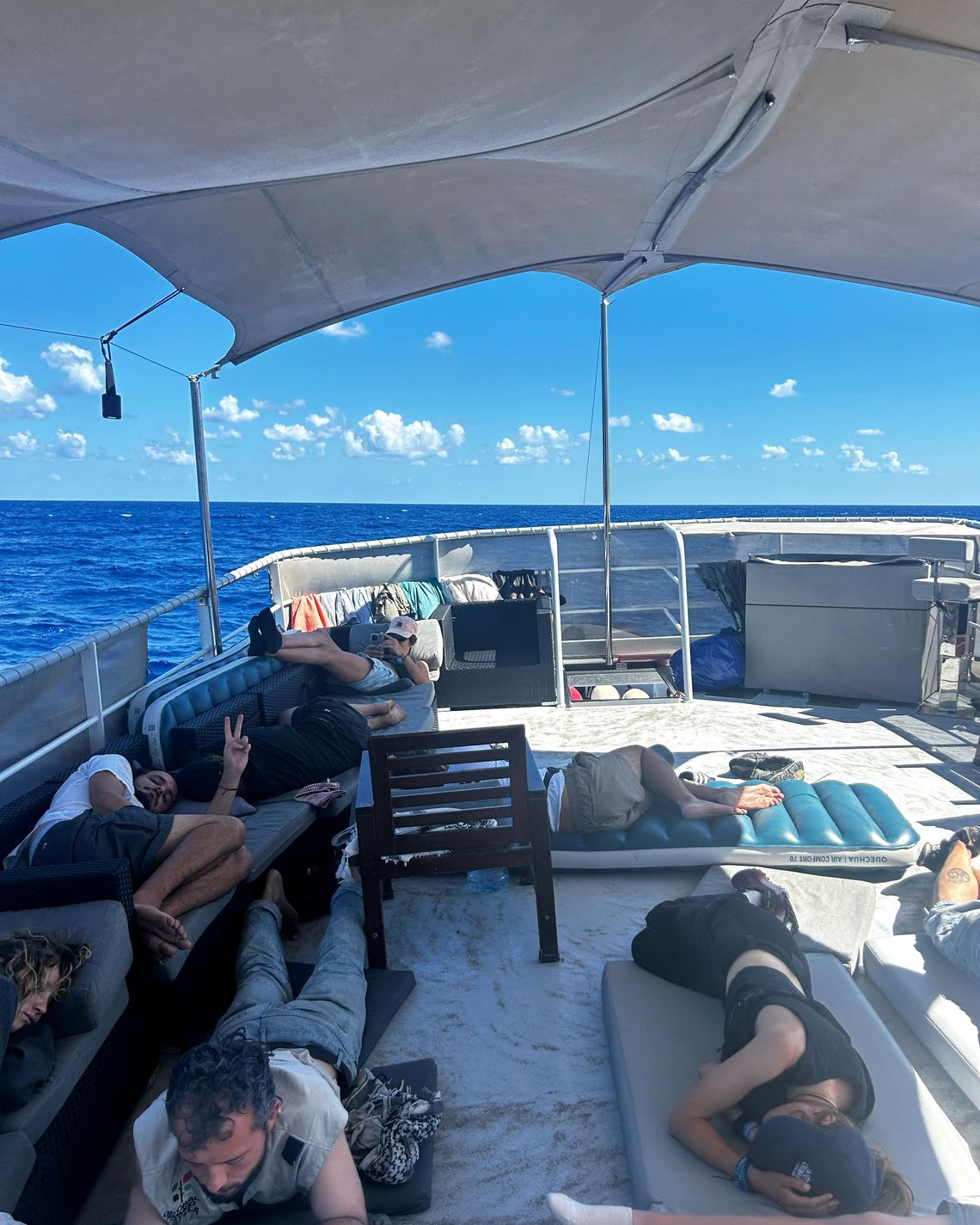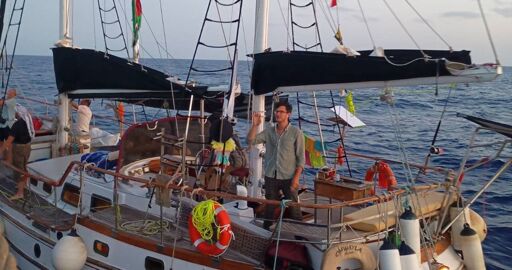
Photo: courtesy David Adler
They sailed toward Gaza in the dark. The ships that made up the Global Sumud Flotilla — a grassroots humanitarian-aid mission bringing supplies like rice, lentils, baby formula, and basic medicine — had set sail from Spain, Italy, Tunisia, and Greece in late summer and had been crossing the Mediterranean for weeks. The need was dire, the odds bad: Of the dozens of humanitarian-aid ships that have tried to reach Gaza over the nearly two decades of Israel’s blockade, the Israeli military has intercepted or attacked all but a few. Some missions were undertaken by a handful of activists on a single boat. This flotilla, with 42 ships and 462 activists from over 44 countries, was one of the largest to ever make the attempt. Israeli drones had already dropped incendiary devices on two of the ships near Tunisia. “When we were entering the red zone, the feeling was, Who knows what’s going to happen,” says David Adler, an American who was on one of the smaller boats. “Maybe we’re going to really overwhelm the Israeli Navy and draw them in and sail our way to the shores of Gaza and deliver this aid.” They were 70 nautical miles from Gaza when the first Israeli ships showed up on October 1.
Their convoy was moving forward through the night when Israeli military vessels began circling them, jamming their signals and sweeping spotlights across their hulls. “Turn off your engines!” boomed a loudspeaker. “A huge barge started chasing down our little sailboat and trying to ram into us,” says Adler. The Israeli soldiers surrounded one of the largest ships and boarded it. Then another and another. Within a few hours, Adler says, “we saw the points of sniper lasers on our faces and our chests. And then it was like, ‘Okay. It’s over.’” By early the next morning, on October 2, Israeli soldiers had confiscated their ships, their belongings, and the supplies they were bringing to Gaza, and the flotilla participants were shuttled to Ktzi’ot prison in the Negev Desert — where some of them would stay for days without charges, access to a phone, or, in some cases, any contact with a lawyer. Israel’s ambassador to the U.N. described the Global Sumud Flotilla as a “stunt.” Adler and others describe what Israel did to them as “kidnapping.”
After two years of Israel’s genocide of Palestinians in Gaza, flotillas have reemerged as a desperate symbol of solidarity. Between 2008 and 2018, humanitarian-aid ships organized by activists from around the world attempted to reach Gaza by sea more than 30 times. Only the first five missions were successful. The Israeli government, which controlled Gaza’s land borders and restricted where Palestinian fishermen could fish, was so aggravated by the emergence of these flotillas that they were one reason it decided to enforce a full naval blockade beginning in 2009. A year after that blockade began, Israeli commandos intercepted an aid flotilla and boarded a Turkish ship on which they killed nine Turkish activists and injured dozens more, including one who was shot by an Israeli soldier and later died in a coma. Although no flotillas have managed to reach Gaza since, the desperation of the moment has pushed activists to try again. Earlier this year, Israel imposed a complete halt on all aid to Gaza for months, causing mass starvation; then, after U.S. and Israeli private contractors opened a smattering of aid-distribution sites around the territory, the Gaza Health Ministry says Israeli troops fired on and killed over 2,500 Palestinians who were trying to get food there — attacks that the Israeli military denied. In response, this year, five separate flotillas, including the Global Sumud Flotilla and a subsequent mission intercepted last week, attempted the trip before Israel and Hamas signed a tentative cease-fire agreement on October 9.

Photo: courtesy David Adler
Palestinians have organized their own mutual aid. Grassroots groups such as the Sameer Project, started by Palestinians in the diaspora, raise funds outside Gaza and entrust Palestinian friends and coordinators inside the territory to distribute food, water, and other supplies, often at great risk to themselves. That’s alongside an endless stream of crowdfunding campaigns aimed at benefiting specific individuals and families, only some of which reach their goals. In contrast to this work, a flotilla can seem abstract: unlikely to reach its destination, unable to bring as many supplies as a stream of trucks could. Meanwhile, Israeli officials loudly denounce flotilla organizers and claim that activists such as Greta Thunberg — who sailed on two flotillas this year, including the Global Sumud — are only in it for the “selfies.” The stuntiness of a flotilla is part of its appeal, although organizers say the goal is drawing attention to Palestine, not themselves. “The flotilla’s power is in proving that when the governments are failing, ordinary people can still bring about some sort of humanity,” says Sumer Mobarak, a coordinator for the Global Sumud Flotilla. Even if the ships don’t reach land, participants hope that publicizing their photogenic, high-risk adventure with nonstop social-media posts will draw attention to what they see as the cruelty of Israel’s blockade. They also know that sailing anywhere near Gaza all but guarantees that Israel will detain them, and they want the world to watch. A ship from the most recent flotilla was named Conscience.
One of Adler’s goals for the flotilla was “to force a diplomatic confrontation.” Adler is a 33-year-old political economist who grew up in Los Angeles, worked on the foreign-policy advisory team for Bernie Sanders, and has lived in India, Mexico, Greece, and the U.K., among other places. He co-directs an organization called Progressive International and is so well connected in the leftish international politics world that, after he was detained by Israeli forces, Jeremy Corbyn posted a photo of the two of them together calling for Adler’s release. Many of the people who joined the Global Sumud Flotilla are longtime activists, academics, and politicians with varying levels of public profile. While much of the coverage centered on Thunberg, the ships also carried Nelson Mandela’s grandson Mandla Mandela, former Barcelona mayor Ada Colau, and European Parliament lawmakers including Rima Hassan, who is French Palestinian and had joined another flotilla earlier this year. “It did start to feel like a miniature United Nations, as the actual United Nations was just flailing to control or even castigate the State of Israel,” says Adler.
The risk is higher for all Palestinians on these missions. “I’m pretty sure my name is somewhere within the realms of the Secret Service,” says Mobarak, who is Palestinian American and has relatives and a home in the West Bank. She has participated in many pro-Palestine protests in the U.S., including a monthslong encampment in front of Antony Blinken’s house. She opted to join the land crew instead, doing press, managing social accounts, and monitoring the boats’ feeds.
After the flotilla was intercepted, Adler, who grew up in an anti-Zionist household, learned that being Jewish was also a liability. When they reached port and the Israeli soldiers found out he was Jewish, they dragged him away from the crowd by his ear and threw him down, forcing him and another Jewish American, the fundraiser and influencer Tommy Marcus, to stare at an Israeli flag. When Minister of National Security Itamar Ben-Gvir arrived, Adler says they “threw me on the ground again, head down, for Ben-Gvir to have a little personal tête-à-tête — so he could call us terrorists to our face and for a photo op. I mean, this was his show.” Once they arrived at the prison, Marcus says the guards singled him out from the other people in his cell. “It was a daily thing, every time they passed me,” he says. “Calling me a fake Jew, not because I’m half-Jewish but because I don’t speak Hebrew and because I don’t support Israel.” Adler and Marcus both say the Arab men in their group, including those from Algeria and Tunisia, received worse treatment. They saw several of these men taken out of shared cells to be shackled and beaten in an isolation chamber decorated with a Minions shower curtain. Marcus, who saw the chamber only briefly during transit through the prison, says, “I interpreted the curtain as a taunt or even as part of the torture.”
The prison was divided by gender. On both sides, guards set up large screens to play a propaganda video of Hamas’ October 7 attacks — which Marcus describes as a mix of real footage, reenactments, and possibly unrelated clips of Arab men yelling “Allahu Akbar!” — at high volume, on a loop, for hours. In the women’s section, guards had hung a large banner showing a photograph of a destroyed street in Gaza, covered in rubble, with text in bubbly Arabic font that said “The New Gaza.” Many of the detainees were menstruating but were denied both showers and period supplies by the female Israeli guards. “They would dangle an unwrapped pad in the doorway to tease you, then pull it back and laugh,” says Zue Jernstedt, an Army veteran from Pennsylvania who served in Afghanistan. “I don’t know why you would even think of doing this to another woman who’s just sitting there in her own blood.” Jernstedt and other detainees were denied prescription medications. When Marcus asked for his, the guards laughed and said, “No medicine for animals.”
Some detainees were released after a day. For Adler, Jernstedt, Marcus, and most of the other U.S. citizens from the flotilla, it took five. Early on October 7, with no explanation, they were shuttled to the border with Jordan and released to their countries’ representatives. They had their passports back but no money or cell phones. Many of them had been on hunger strike for days. While the citizens of other countries were met by consular employees bearing food, water, and plane tickets, the Americans were admonished by the U.S. consul general for Amman, Sharon Weber, who scolded them, repeating over and over, “We are not your babysitters.” She gave them each a travel visa and a seat on a bus to the Amman airport but no plane tickets or way to buy them. She also handed out copies of a printout from the U.S. State Department’s website with travel tips for Jordan. When they asked her for food, she passed around a few small bags of pretzels — Jernstedt described them as “purse snacks” — to share. The American activists were eventually able to buy plane tickets home with funds raised by the organizers of the flotilla’s U.S. delegation. They would later learn that for the first few days they were detained in Ktzi’ot, the U.S. government had not contacted any of their families.
Last month, President Donald Trump signed an executive order titled Strengthening Efforts to Protect U.S. Nationals From Wrongful Detention Abroad. It has been published on U.S. Embassy websites alongside examples of Americans who were brought home from Russian penal colonies, Afghanistan, and Gaza — the last being hostages captured by Hamas. The American flotilla activists argue they were wrongfully detained as well, albeit by a country whose military is supported and funded by the United States. When I contacted the U.S. State Department for comment on how the activists say they were treated by U.S. consular employees, it responded with a statement that asserted “our personnel on the ground provided all standard services, even though the individuals engaged in dangerous and unlawful activity that was contrary to America’s national interest. Our employees conducted themselves professionally and offered the American citizens information and resources they needed to get back to the United States. Any allegation suggesting otherwise is flat out false.”
The cease-fire agreement was signed as the activists made their way home. The agreement, as written, included a promise from Israel to allow more food and supplies to enter Gaza than it has in months: It would reopen the Rafah crossing to Egypt and allow at least 600 aid trucks into Gaza a day. Eight days later, it has not done either. Alleging that Hamas had broken the agreement by taking too long to return the bodies of dead Israeli captives, Israel has kept the Rafah crossing closed and cut the number of aid trucks allowed in to 300. Hamas officials say that it is physically impossible for them to recover bodies any faster when so many of the dead are buried under rubble and Israel will not allow them the heavy machinery they need; even U.S. advisers have agreed that it would be “impossible” for Hamas to recover bodies without this. International aid agencies are waiting for Israel to allow their trucks back in. On Thursday, UNRWA, the U.N. agency for Palestinian refugees, posted on X that it has “enough food outside #Gaza to supply people there for three months, amid desperate need.” And the cease-fire has not stopped the violence: Hamas officials say that Israeli troops have killed at least 24 Palestinians since it was signed.
Jernstedt feels we’re going through a “mask off” moment in history, both internationally and in the United States. “They don’t care about veterans or civilians,” she says. “We really need solidarity with each other if we’re going to make it through this, both with Palestine and at home.” She, Adler, and other members of the Sumud Flotilla, including people from Brazil, Spain, Turkey, South Africa, and beyond, are already planning the next mission. Sailing season is over, for now. It will start again in the spring. The organizers want to make their next flotilla even bigger with more people from more countries. The planning started while they were still in Israeli prison, Adler says: “We were like, ‘Wow, this is horrible. Anyway, so when’s the next one?’”
From Intelligencer - Daily News, Politics, Business, and Tech via this RSS feed

